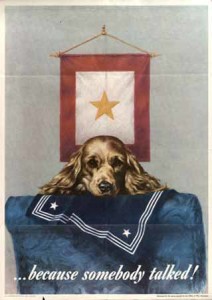Many of my friends – all fellow liberals – have been shocked by the vehemence with which I have condemned Bradley Manning and Edward Snowden. Because of my generally liberal politics, their assumption is that I would value the men’s apparent act of conscience – their desire to see the “right thing” done – over their violation of their oaths of secrecy. I do not, and here is why.
I have been an intelligence professional for over twenty years. I am proud to be a member of the Intelligence Community – an elite group of women and men whom I consider to be some of the finest people I have ever known. Intelligence professionals bring a diverse set of skills to the table: language proficiency, technical know-how, effective writing and speaking skills, the ability to organize and analyze complex information from disparate sources, the ability to think quickly under high stress, knowledge of other cultures and social systems, and psychology training – just to name a few. There is one trait, however, that every single one of us has – absolutely and unequivocally: we can keep a secret.
Secrecy is the lifeblood of intelligence work, not because we fear oversight or because our actions cannot withstand the scrutiny of the light of day, but because the lives of others depend on our ability to keep information – even apparently insignificant details – out of the hands of those seeking to harm our citizens. Whether the topic is troop movements, collection methodologies, or the placement of covert agents – iron clad secrecy is fundamental and essential to effective intelligence operations. The efforts, risks, and sacrifices of thousands of people working over the course of years can be compromised by one file copied carelessly onto a USB drive.
As a result, the safety of our nation requires a class of people for whom secrecy is the highest virtue, people on whom we can rely to never, under any circumstance, reveal classified information. Those people are intelligence professionals, and we hold to the antiquated, anachronistic definition of “honor” that means we value our oath of secrecy over comfort, convenience, expedience, or other loyalties. This is not hyperbole, nor is it overkill – it is absolutely necessary that we have such people for our nation to be safe.
What about the other requirements of honor? What happens when one of us learns that members or agencies of our government – the body which acts on behalf of all of us who are “we the people” – act in a way that is cruel, dishonorable, illegal, or evil? The simple answer is that we must act to prevent such things where possible, and punish them when necessary; but there are processes in place for just those purposes. There are oversight committees, ombudsman inspectors, and open door policies – all within the cleared community – and each offers recourse for reporting abuses.
Are these methods perfect? No. Will some things, even shameful and patently wrong actions, slip through the cracks? Almost assuredly. No system is perfect, and if the Manning and Snowden cases indicate failures in those oversight processes we should pour considerable resources into resolving those failures.
That does not exonerate Manning and Snowden. Even if there were no obvious casualties from their leaks, even if none of the information they provided would be of intelligence value to our enemies, even if they only made public information that our enemies already knew – they still broke their oaths of secrecy. Every member of the intelligence community, from the PFC all-source analyst in a TOC to the National Security Adviser, only sees a piece of the puzzle. It is not our job to determine what is and is not of value to our enemies.
It is our job to be people whom the nation can trust to always, in every circumstance, keep every single secret which has been entrusted to us. That is a sacred trust, and failing in it is a cardinal sin. It is, in fact, the cardinal sin, and those who commit it – except under torture – are traitors.
There are other jobs, other virtues, and other sins, and I think it is important that we have a public, national dialogue on what we consider the proper, ethical path for our nation to follow – both in overt politics and in covert intelligence. Whatever that path, the lives of our warfighters, our public safety personnel, our civilians, and our allies all depend on the willingness of the intelligence community to do, under any circumstance, what we have promised to do – keep our nation’s secrets no matter what.



